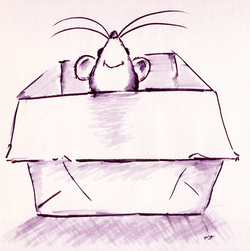
If the day of love makes you feel like ordering a large pepperoni pizza and eating it all by yourself or downing a gallon of Håagen Dazs, you’re not alone. Some of us are still trying to get over a bad case of VDD, Valentine Deficiency Disorder.
While $100,000 is spent each year on flowers, many of us don’t even get a single daisy much less a dozen roses. Could it be that our loved one took our diet resolutions seriously? If so, you likely won’t be at the receiving end of one of the 300,000 boxes of candy to be sent on February 14th. My own mailbox has been empty since the celebration began in the 5th Century and certainly since Be Mine messages started going out in the 1700s.
To make matters worse, many are finding that the cold, rainy days of winter bring on the blahs, the blues, cabin fever and a desire to relieve our boredom. Five-percent of those affected by the shorter days and lack of sunshine feel hungrier during these colder, darker months. As you sit home, your refrigerator calls to you. There’s a good reason.
Our serotonin, a neurotransmitter associated with hunger control, drops during the colder, darker months. When we begin to crave baguettes, mashed potatoes and tortellini, the compulsions are not all in our heads. These yummy foods, specifically the carbohydrates they contain, raise the levels of tryptophan in our brains. This causes the release of serotonin. We are rewarded with a boost to our mood.
So you think - I feel so hopeless, I just promised myself that I’d lose ten pounds, and now the weather is sabotaging my efforts. What next? I’ve got help for you, but it requires exercise, an exercise. Instead of focusing on the positive, I’d like you to consider a subject that is scandalously the opposite. Ask yourself; what do I hate? To what do I have an aversion? A passionate dislike? What people, places, activities, events and situations make me feel like I’m in prison? Try to think of things that you encounter on a regular basis, disagreeable circumstances that challenge you more than once in while, because these are the things that regularly trip you up.
Be honest. What puts your body and mind into escape mode, which could translate into the intense feeling of being a trapped, caged and then hungry? A too chatty neighbor? A passive aggressive coworker? Any situation that gets you thinking about how good cleaning your oven would be. Don’t feel compelled to share your insights about what makes you feel trapped, frustrated, or tortured with anyone. They’ll have a list of their own, and what if you’re on it?
Scientists tell us the human nervous system is similar to that of rats. Insights into why our weight-loss or give-up-smoking plans fail have been found by studying the responses of these beady-eyed creatures to their surroundings. Even though I’m rodent phobic, I’d like to share an interesting study I read recently.
One group of rats was confined in cages with nothing to do except choose between drinking regular sugar water or water laced with opiates. Guess which lever they pushed.
Another luckier group was placed in a delightful, zoolike space called Rat Park. In this environment they could burrow, run through tunnels, visit with friends and roam about freely doing the things that rats love. This second group was offered the same addictive cocktails. But guess what; they chose to drink only plain sugar water!
One might conclude that the confined group accidentally pushed the lever a few times and got high. After that they were powerless to stop. They had a serious addiction, but it was only physical. But this is a study about how environment contributes to compulsive, behavior. Also it’s a story with an encouraging message.
Eventually, as part of the experiment, the “junkie” rats were given a reprieve from their deprived, unproductive imprisonment. Moved to the more interesting Rat Park, the addicted rodents stopped pressing the opiate lever. They turned away from their obsession and got busy doing things they enjoyed. Their new behavior caused physical withdrawal, but they endured it.
Martha Beck. In The Four-Day Win, Suggests The Three Bs, things you can do to relieve you own feelings of being a rat in a cage. This positive behavioral strategy just might keep you out of dangerous, I-can’t-help-myself territory.
· Bag it: Don’t do it unless to not would produce an outright catastrophe.
· Barter: Trade with someone else. Or if you are in a position to, delegate it.
· Better: Add elements that make the situation more tolerable.
My advice is always to start small, but continue to practice your new approach. Don’t be dramatic about this. Even modest attempts at bagging, bartering and bettering can keep your mind open to a sense of your own freedom. Remember you can choose which lever you push
 RSS Feed
RSS Feed
